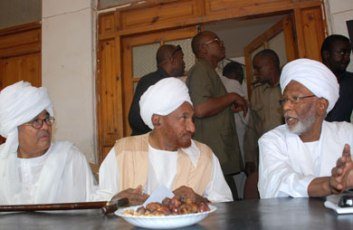Opposition parties to continue dialogue with rebels over ways to topple Sudanese regime
January 17, 2013 (KHARTOUM) – The Sudanese opposition coalition has decided to continue dialogue with the rebel alliance on a common vision that leads to overthrow the regime of President Omer Al-Bashir.

The National Consensus Forces (NCF) announced in a statement issued Thursday in Khartoum that the opposition forces, after a long debate on the Kampala declaration, had decided to continue dialogue with the Sudanese Revolutionary Forces (SRF).
The statement stressed its decision is based on strategic perspective aiming to preserve the unity of the country, its safety and security. It also emphasized that the purpose of this dialogue is to reach a common vision on how to bring down the regime and reestablish democracy in Sudan.
The opposition further described the “New Dawn” charter as a draft document to study and make proposals regarding the final version.
The leader of the opposition Umma National Party, Sadiq Al-Mahdi, said in a TV remarks on Tuesday that his party does not agree with the document finalized in Kampala, because it gives legitimacy to the armed action against the regime, and thus authorizes the regime to put more restrictions on freedoms and the opposition parties.
He further said that whoever brings any change through violence would not treat the opposition forces as peer allies.
He added that for these reasons, his party does not support military action, as he sees no reason for the introduction of self-determination for any part of Sudan in any political agreement.
“We believe that any solution must maintain the unity of Sudan,” he stressed in reaction to the inclusion of the right of self-determination for the Sudanese provinces in the text of the charter.
After the announcement of the Charter, the opposition political forces indicated that their signatures were preliminary and non-binding. They underscored that what came out was not a final document, but a text for deliberation and discussion between the forces involved in the meeting.
In a meeting held in Kampala on January 12, the rebel groups decided to form a committee for follow-up and coordination to gain more political forces and civil society organizations in support of the document.
The SRF forces justified the formation of the committee from the rebel movements and allied forces, saying the parties and political forces inside are still studying the charter and running more consultations on it.
The opposition NCF have decided to call for another meeting on Monday January 21th, at the level of heads of political parties to discuss the current political situation in the country and work for the release of opposition members who had participated in Kampala meeting.
The Sudanese authorities have arrested five opposition leaders who had participated in the Kampala meeting immediately upon arrival at the airport in Khartoum; as they arrested Abdul Aziz Khaled, after signing the charter and his return to Khartoum.
Further, the security agents arrested Ibrahim Al-Sheikh, leader of the Sudanese Congress Party after a press conference he held in Khartoum to criticize the opposition for sending law level delegates to take part in Kampala meeting.
Ibrahim blamed the opposition forces for sending low level delegates saying they had to dispatch leading members from inside the country instead of delegates residing outside the country.
(ST)
